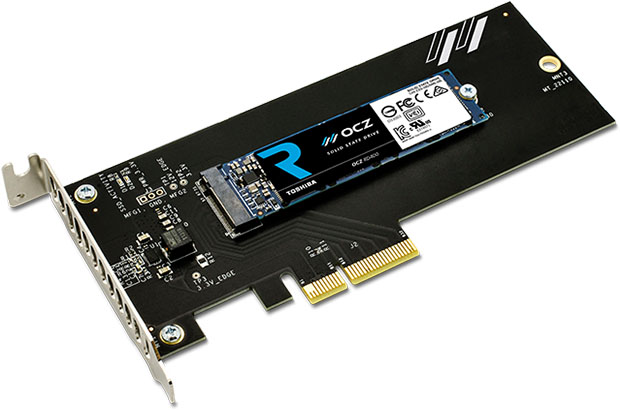- Qualcomm Launches Snapdragon 4 Gen 2 Mobile Platform
- AMD Launches Ryzen PRO 7000 Series Mobile & Desktop Platform
- Intel Launches Sleek Single-Slot Arc Pro A60 Workstation Graphics Card
- NVIDIA Announces Latest Ada Lovelace Additions: GeForce RTX 4060 Ti & RTX 4060
- Maxon Redshift With AMD Radeon GPU Rendering Support Now Available
Toshiba Launches OCZ RD400/RD400A NVMe M.2/PCIe Solid-state Drive
OCZ pioneered the introduction of PCI Express SSDs to the consumer market, so one could say it was only a matter of time after its acquisition by Toshiba before a new PCIe SSD was launched. The OCZ RD400 looks to tick all the right boxes; it ranges in 128GB through 1TB capacities in a svelte M.2 2280 form-factor and includes the latest NVMe protocol support for full performance and lower CPU overhead. For users without a full speed M.2 slot, OCZ has you covered as all RD400A models denoted with an ‘A’ on the end ship pre-slotted into a PCIe 3.0 x4 adapter card.

Performance is about what one would come to expect from a PCIe-based SSD that isn’t limited by the SATA interface or a x1/x2 M.2 slot. The 1TB model will need the full PCIe 3.0 x4 bandwidth to peak at a respectable 2.6GB/s reads and 1.5GB/s writes, with random IOPS slotting in at 210K IOPS reads and 130K IOPS writes. Versus other offerings the RD400 favors strong sequential performance a little more than random IOPS, though at these speeds that is small potatoes indeed.
The drives utilize Toshiba’s own 15nm MLC NAND with the RD400’s controller likely to be an in-house custom chip. Official pricing is unknown, though Newegg already is offering all RD400A models which include the PCIe adapter card, starting at $139.99 for the 128GB model to $789.99 for the 1TB version.
| 128GB | 256GB | 512GB | 1024GB | |
| Sequential Read | 2,200MB/s | 2,600MB/s | 2,600MB/s | 2,600MB/s |
| Sequential Write | 620MB/s | 1,150MB/s | 1,600MB/s | 1,550MB/s |
| Random Read IOPS (4K) | 170K | 210K | 190K | 210K |
| Random Write IOPS (4K) | 110K | 140K | 120K | 130K |
| Endurance (Total Bytes) | 74TB | 148TB | 296TB | 592TB |
| Daily Usage | 40GB/d | 81GB/d | 162GB/d | 324GB/d |
Also being introduced with the RD400 is OCZ’s new advanced warranty program: simply create a support ticket and a support technician will reply by the next business day. If the drive is determined to be defective, OCZ will not only send a pre-paid return label but will also ship out a brand new replacement within a business day, minimizing downtime, costs, and hassle in the unlikely event there is a problem with the drive. The deal sounds very generous given the RD400’s five-year warranty, and it underscores the strength of Toshiba’s commitment to its customers.



